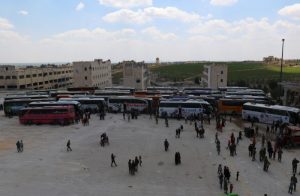
By Jamie Freed
SINGAPORE (Reuters) – Some major airlines were re-routing flights on Wednesday after Europe’s air traffic control agency warned aircraft flying in the eastern Mediterranean to exercise caution due to possible air strikes into Syria.
Eurocontrol said in a notification published on Tuesday afternoon that air-to-ground and cruise missiles could be used over the following 72 hours and there was a possibility of intermittent disruption to radio navigation equipment.
U.S. President Donald Trump and Western allies are discussing possible military action to punish Syria’s President Bashar Assad for a suspected poison gas attack on Saturday on a rebel-held town that had long held out against government forces.
A spokeswoman for Air France said the airline had changed some flights paths following the warning, including for Beirut and Tel Aviv flights, while budget airline easyJet said it would also re-route flights from Tel Aviv.
Aviation regulators have been stepping up monitoring of conflict zones since Malaysia Airlines flight MH17 was downed by a surface-to-air missile over Ukraine in 2014, killing all 298 people on board.
Recent warnings have tended to be after military action has started, and so Eurocontrol’s pre-emptive notice suggests a heightening of regulatory scrutiny.
Trump on Tuesday cancelled a planned trip to Latin America later this week to focus on responding to the Syria incident, the White House said.
Trump on Monday warned of a quick, forceful response once responsibility for the attack was established.
The Eurocontrol warning on its website did not specify the origin of any potential missile threat.
“Due to the possible launch of air strikes into Syria with air-to-ground and/or cruise missiles within the next 72 hours, and the possibility of intermittent disruption of radio navigation equipment, due consideration needs to be taken when planning flight operations in the Eastern Mediterranean/Nicosia FIR area,” it said, referring to the designated airspace.
Aviation regulators in countries including the United States, Britain, France and Germany have previously issued warnings against airlines entering Syrian airspace, leading most carriers to avoid the area.
The only commercial flights above Syria as of 0115 GMT on Wednesday were being flown by Syrian Air and Lebanon’s Middle East Airlines, according to flight tracking website FlightRadar24. At other periods later in the day, there were no flights using the airspace.
HEIGHTENED SURVEILLANCE
Eurocontrol included a broader area outside the airspace controlled by Damascus in its statement.
A spokesman for Germany’s Lufthansa said on Wednesday its airlines were aware of the Eurocontrol warning and were in close contact with authorities.
“As a proactive precaution, Lufthansa Group airlines have already avoided the airspace in the eastern Mediterranean for some time now,” he said.
Ryanair, British Airways, Etihad Airways, and Royal Jordanian representatives said flights were operating normally at their respective airlines, but the situation was being monitored closely.
Emirates also said it was closely monitoring the situation and that it would “make adjustments as needed”.
EgyptAir is not currently planning changes to flight paths following the warning, a source close to the matter said.
Israel’s flag carrier El Al declined to comment. EgyptAir and several other major airlines that fly in the area did not respond immediately to a request for comment.
The Nicosia flight information region named in the Eurocontrol statement covers the island of Cyprus and surrounding waters, according to a map on the agency’s website.
The same map did not designate any specific territory as being the “Eastern Mediterranean” region.
Last year, North Korea tested missiles without warning, leading some airlines to re-route flights to avoid portions of the Sea of Japan.
Eurocontrol’s warning cited a document from the European Aviation Safety Agency (EASA), Europe’s safety regulator.
EASA warned of a danger to aircraft flying over Iran, Iraq, and the Caspian sea in October 2015 after Russia fired cruise missiles at Syrian targets from the Caspian Sea.
An EASA spokesman said it had informed member states and Eurocontrol of its cautionary message on Tuesday.
(Reporting by Jamie Freed in SINGAPORE; additional reporting by Victoria Bryan in HAMBURG, Alexander Cornwell in DUBAI, Sarah Young in LONDON, Conor Humphries in DUBLIN, Tova Cohen in Tel Aviv and CAIRO Bureau; Editing by Robert Birsel, Mark Potter and David Evans)









